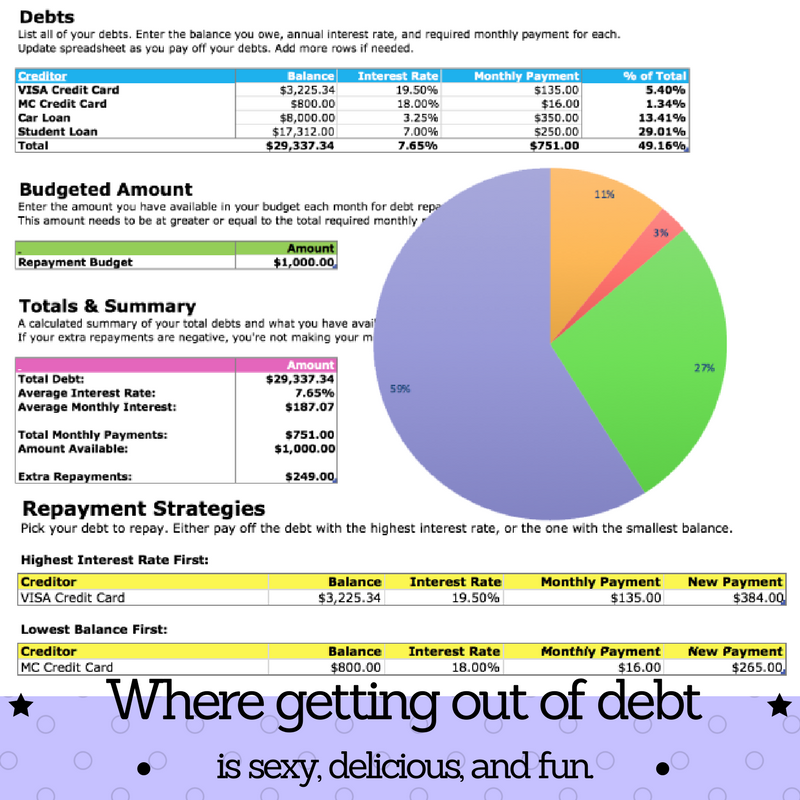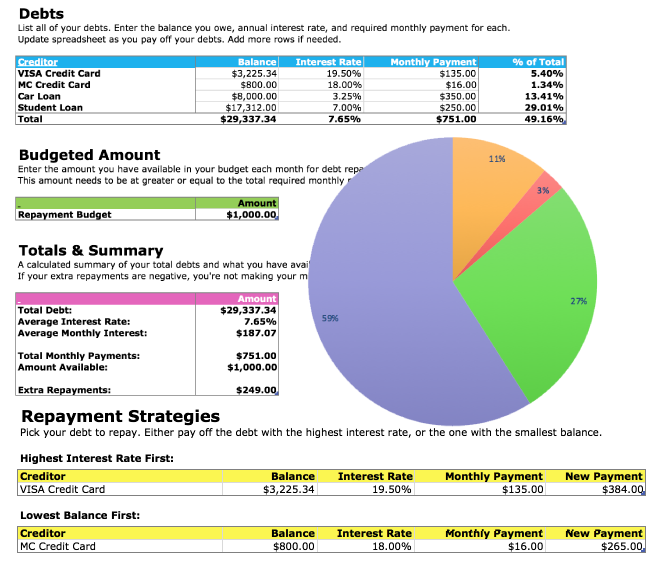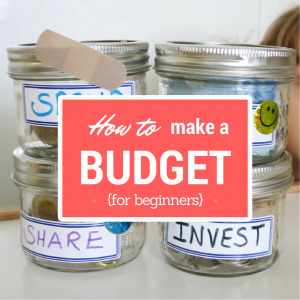

Debt is not your friend, and you should not be friendly with your debt. It’s time to end the relationship with your debt by getting debt-free. Tiny steps today reduce big interest charges tomorrow.
The household debt numbers are rising across the United States and Canada, and Canadians are leading in indebtedness with a debt-to-income ratio at a record 1.71% – so for every dollar of household income there is $1.71 in credit debt. This is a BIG number, and it includes consumer credit, mortgage, and non-mortgage loans. With interest rates on the rise, your debt repayments will be higher too.
So let’s do something about it. To get started on this getting out of debt journey you’ll need two things. First, you need to be brave and find your sense of debt-hating desire. To get out of debt you must want to do it, badly. Don’t hide from it. Don’t feel stuck. Get into action.
Second, you’ll need bills and statements from creditors. If you’ve already listed the numbers and names in your Budget Spreadsheet (which shows your income, expenses, and what your owe) — then pull up those files. If not — no worries. We’ll get the stuff together today. Kudos.
Getting out of debt!
I have TWO getting out of debt spreadsheets for you, and both are easy to use. There’s the new one for 2021 with graphs, and there’s the original version. Both spreadsheets calculate your numbers and give you the big picture — but a spreadsheet doesn’t do the work for you. You do the work for you.
Regardless of which debt reduction version you choose, I’ve kept things super simple by listing the biggest debt-busting categories and showing you how it all adds up.
Debt Reduction Spreadsheet (2021)
Download: Debt Reduction Spreadsheet (2021)
Original Version

Download: Debt Reduction Spreadsheet (original)
The idea is to track your creditors, list the balances due, see the interest rates on your debt, make your monthly payments, and then target one debt using an amount you have available for extra payments.
Related:
Read all those debt-busting articles. Many posts include TV and video if you prefer watching over reading. I want you to succeed.
Step 1: Get the tools.
Download the version you prefer. All the data is stored on your end, so it’s private.
Step 2: List it out, add it up!
I want you to take a close look at your debts. Start by listing all your creditors or lenders in the left column. Then move down and across.
- List your lenders: List your credit cards, student loans, HELOCs, line of credit, and the IOU from grandma.
- Balances Due: Following along, enter the balances due — your total amount owing each lender.
- Interest Rates: Next up is your interest rate on the debt. If you’ve got credit card debt then you may have rates over 18%. Track it all down.
- Minimum Payments: Keep up with your minimum payments to maintain a good credit score. But to reduce debt you’ll need to increase the minimum amount to dig into the principal.
Now that everything is entered, see how the numbers add up! In the example above, you’ll see a total debt of $274,987.45 with an average interest rate of 4.50% (totalling $1,031.56 in average monthly interest), and a total monthly payment of $2,596.46. In this example, there’s cash available to put against debt — $379.54 to be exact.
Step 3: Finding more money.
For those with little wiggle room in your budget for debt repayment, there are few options. The answer is simple, but not easy.
- Cut costs: Cutting back and spending less money on your variable expenses is a surefire way to add additional dollars to your debt repayment plan. Cut repeatable expenses, subscriptions, streaming, automatic billings you forgot about. Reduce your grocery bill (buy generics, switch to discount grocers, cook at home, don’t eat out). See 50 Ways to Save $1,000 a Year for a few more ideas.
- Boost income: This is where you have to really want to get out of debt. Working an extra shift, freelancing, finding an off-hours gig, selling unneeded items are all tactics I have taken to boost my income. This works.
- Negotiate a lower credit card interest rate: Asking for a lower rate is free. And since most credit cards charge anywhere from 0% to 20% in interest, making a five-minute phone call could save you hundreds, even thousands in interest charges. See How to negotiate a lower credit card interest rate for the script.
In the next step I’ll deal with how to apply this extra repayment against your debt.
Step 4: Make extra payments against ONE of your debts.
Yes, you must pay more than the minimum payment on your credit cards to get out of debt. How do you choose what to pay down first? You can attack the balances in one of two ways:
One: Target your highest rate: Go with the mathematical reality that your highest rate debt is costing you the most money. Attack your highest interest rate debt first and when it’s paid off, move on to the next highest interest rate.
Two: Pay off your lowest balance: Need a mental win? Work on the card with the lowest balance to give you the psychological boost of accomplishing debt repayment. You’ll feel good seeing results quickly and be motivated to tackle the next credit card. If you have two debts with similar balances, then pay off the debt with the higher interest rate first.
Step 5: Pick a debt-free date.
Your debt-free date is the projected day you plan to pay off all your debt. Your debt-free day is projected because life comes at you fast and who knows what your income, housing, and life’s needs will look like in two to three years. Look at how much money you owe, and roughly divide your payments into months. Don’t take more than three years to pay it off, ok? You’ll feel frustrated, so aim for under three years. Write this date on your calendar. Shoot for sooner.
Step 6: Stick with it!
Whether you pick to pay off your smallest balance to start or choose to end the debt with the highest interest rate first, the point is to stick with it! Once you’ve retired one debt, move that payment to your next creditor on your Debt Reduction Spreadsheet.
And don’t forget: How to set money goals that slay and get my free budget spreadsheet.
You don’t have to track all your money, just the cash you want to keep!
Love love love,
Kerry


